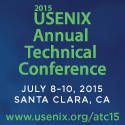
Get more
Help Promote graphics!
Maxime Debosschere and Floris Geerts, Universiteit Antwerpen
In recent work, Salimi and Bertossi provide a tight connection between causality and tuple-based data repairs. We investigate this connection between causality and two other kinds of repair models. First, we consider cell-based V-repairs, i.e., repairs that are obtained by modifying cells in the data. In contrast, tuple-based repairs only allow for the deletion of tuples. Second, we introduce a new notion of repairs, called chase repairs, that take into account the procedural (chase) steps that lead to a repair. We establish a connection between causes (and the associated notion of responsibility) and V-repairs, and analyse the complexity of verifying whether a cell is a cause and whether its responsibility is above a certain threshold. Our understanding of chase repairs is still very preliminary, and we argue that provenance models that are specifically targeted to data repairs and data quality in general are needed to make formal connections between causality and chase repairs.
Open Access Media
USENIX is committed to Open Access to the research presented at our events. Papers and proceedings are freely available to everyone once the event begins. Any video, audio, and/or slides that are posted after the event are also free and open to everyone. Support USENIX and our commitment to Open Access.
author = {Maxime Debosschere and Floris Geerts},
title = {Cell-based Causality for Data Repairs},
booktitle = {7th USENIX Workshop on the Theory and Practice of Provenance (TaPP 15)},
year = {2015},
address = {Edinburgh, Scotland},
url = {https://www.usenix.org/conference/tapp15/workshop-program/presentation/debosschere},
publisher = {USENIX Association},
month = jul
}
connect with us